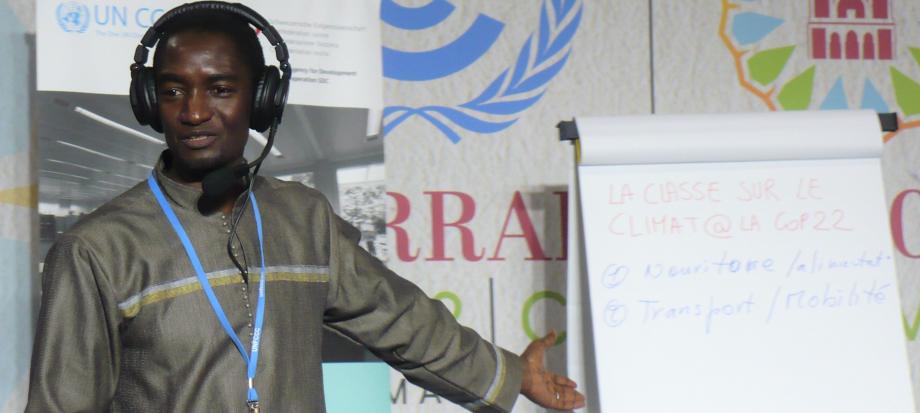|
It appears that the more time we spend out of the United States, the more we learn about it. Though we don’t have adequate representation at COP23, there is still a lot of talk about making a “just transition” to clean and renewable energy. Today, my colleagues and I attended a discussion lead by Moustapha Kamal Gueye, the Coordinator of the ILD Green Jobs Programme, in which he discussed the future of green jobs as well as jobs focused around fossil fuels. As Gueye described, a “just transition” is one where the individuals negatively affected by a transition to clean energy are properly cared for. This transition would entail a few important policies to be implemented: proper social security, technical skill training or retraining programs, and “tripartite” social dialogue, which means that the conversation is jointly between the government, the employer, and the workers.
President Trump has offered his support for the fossil fuel industry, in hopes of creating more jobs for Americans, but a transition to renewable energy would result in an estimated net increase of 60 million jobs when compared to the fossil fuel industry, with jobs offered in multiple skill levels. Technicians will be required for solar panels, wind turbines, as well as maintenance workers, engineers, etc. It is important to consider three different points when considering this transition: new jobs will be created, some jobs will be substituted or transformed, and others will be completely eliminated. In addition, while more jobs will become available, location also matters. Locations that are more focused on renewables will benefit from the switch to a focus on clean energy, while areas that have relied on fossil fuels for revenue may face a deficit in job numbers. It is apparent that our country is not at this point yet, and it seems that we have put an emphasis on a general education through college degrees rather than focusing on technical skills that can enable one to be an expert in construction, manufacturing, architecture, among other fields that will be essential for a “just transition.” Do we need to revolutionize our education system, which has been accused of being outdated? Do we need to change how the social dialogue occurs; should workers be a part of the discussion? What do you think? If you’d like to learn more about the economics regarding a just transition from fossil fuels to clean energy, skim through the document linked below:
6 Comments
Jake O'Neill
9/11/2017 09:45:37 am
Is any discussion of the "Just Transformation" centered upon the promises of car manufacturers and their plans to get away from the combustion engine? What kind of job substitutions are being predicted in terms of car companies and transportation in general?
Reply
Madison
15/11/2017 01:45:04 pm
The net increase of 60 million jobs really surprised me. That is great for workers and the economy, but like stated, what happens during that transition into renewable energy. Other jobs are lost from fossil fuels and other industries, or they change, putting workers in an awkward spot. Another question to ask is what about all the starting fund money needed to build these renewable energy structures? Or to pay all these new workers? It's an interesting topic to discuss .
Reply
Olivia Hare
15/11/2017 09:33:16 pm
I always agreed that the idea of renewable energy could create a lot more jobs than the fossil fuel industry would. Jobs in the renewable energy industry also has a more advance skill set. It would be hard for people coming out of the fossil fuel industry to make this transition. Would it really be possible to provide for all of those people if they find that they are not equipped for the positions in the renewable energy industry.
Reply
Aaron McCulligh
15/11/2017 10:27:58 pm
The use of renewable energy is great. I really like the idea of the "just transition" it really shows how easy it could be to develop more renewable energy sources. But it still worries me that it really may not be that easy. This is mostly because we have so many workers in the fossil fuel industry that just aren't trained for renewables. And that would add a big cost for training these employees on top of the already expensive renewable project. Really wish it wasn't this was though because renewables really do make a difference.
Reply
Alessandro Matarazzo
16/11/2017 06:50:16 am
The "just transition" sounds like a great idea, especially because the previous workers of nonrenewable energy companies would be retrained and have jobs in the renewable energy area, which is a big positive. But if the "just transition" does happen is it worth the loss of smaller towns that rely on fossil fuels for income and jobs.
Reply
Andrew
13/12/2017 10:37:47 am
I think that the feeling people have these days of having to go to college to get a decent job is something that shouldn't be completely true. There should be more focus on technical schools where people can learn about one particular job and skills set instead of just going to college because they feel it is what they have to do. I think more than just employers should be in on the discussion of what people should have to do in order to get certain jobs, because employers always want more, but they may not need more and employees can help clear that confusion.
Reply
Leave a Reply. |
Categories
All
Archives
March 2024
|

 RSS Feed
RSS Feed
